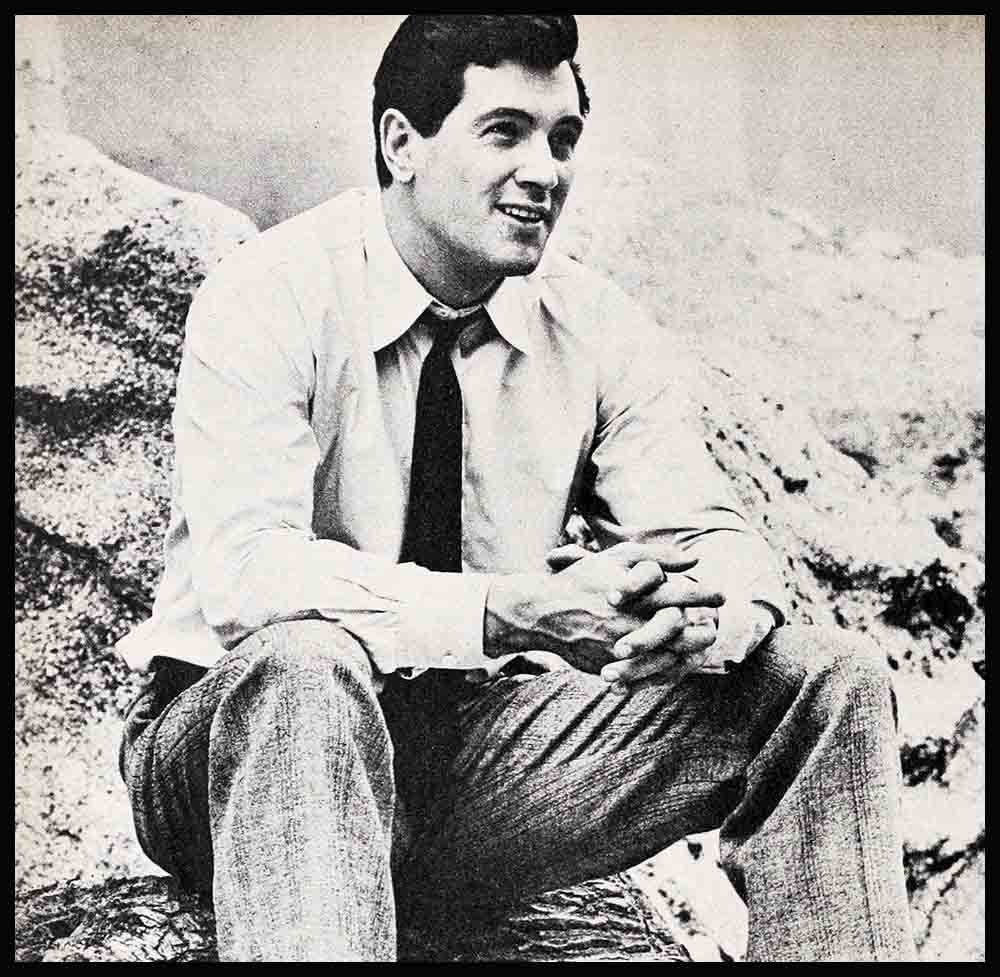
The Rock Hudson Story
PART II
WHAT HAS GONE BEFORE: Part I of Joe Hyams’ life story of the man legally named Roy Fitzgerald told of his boyhood, his disturbed family life, his early search for a way of life. Rock was a letter carrier on the streets of Winnetka, Illinois, a truck driver in Hollywood and later a bit player.
When a man stands in front of a mirror shaving, there come the days when he stops looking at the whiskers and takes a good look at himself. On one such occasion recently, Rock Hudson looked at his face in wonderment and asked himself—for perhaps the fiftieth time—what am I doing here in this house in Hollywood as a movie star?
AUDIO BOOK
Rock has never been able to satisfy himself with an answer. None of his countless biographers have ever been able to draw from the series of events which brought him to Hollywood and stardom any common denominator. Nor have his chroniclers or he ever been able to force from his life any familiar blueprint for stardom.
Not long ago I asked Rock when and why he decided to become an actor. The question was a logical one, following as it did Rock’s own cruel analysis of himself as a shy, awkward “goop” who “isn’t even very bright.”
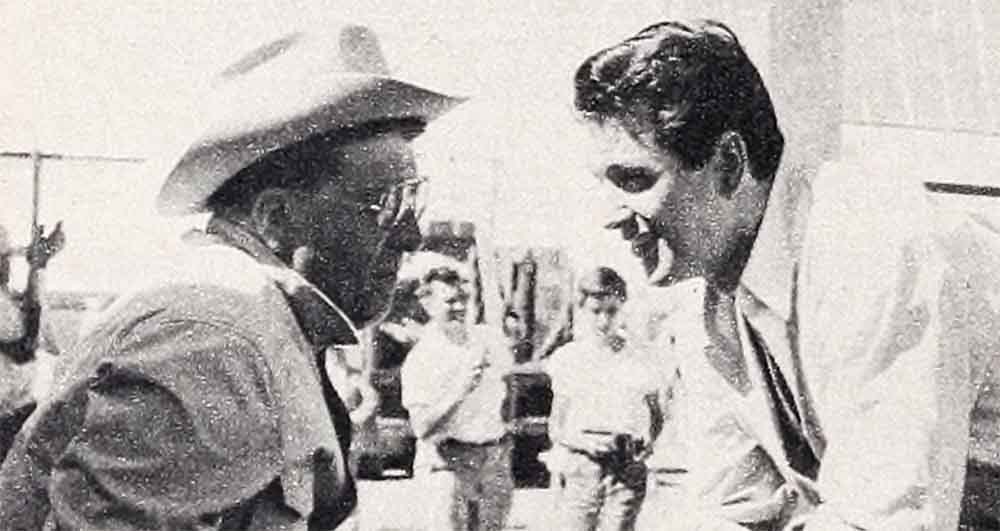
Rock thought a long time before answering. Finally he said simply, “I really don’t know when or why I decided to become an actor. I guess I just always knew that some day I would be one.”
That’s about all the trail there is to follow if one tries to make any logical deductions from the life of Rock Hudson. Romanticists would call it destiny. A pessimist would say he fell into it. There’s something to be said for both sides.
Rock is and always has been as open and honest as he seems to be on screen. The quality of honesty which he brings to all of his screen portrayals is no credit to Rock’s acting ability. He is honest, almost to an extreme. A publicist at Universal-International and a close friend of Rock’s recalled for me recently the only lie he ever told her. When she was writing his biography he tried to take an inch off his height and said he was six feet three instead of six feet four because he was always embarrassed by being so tall.
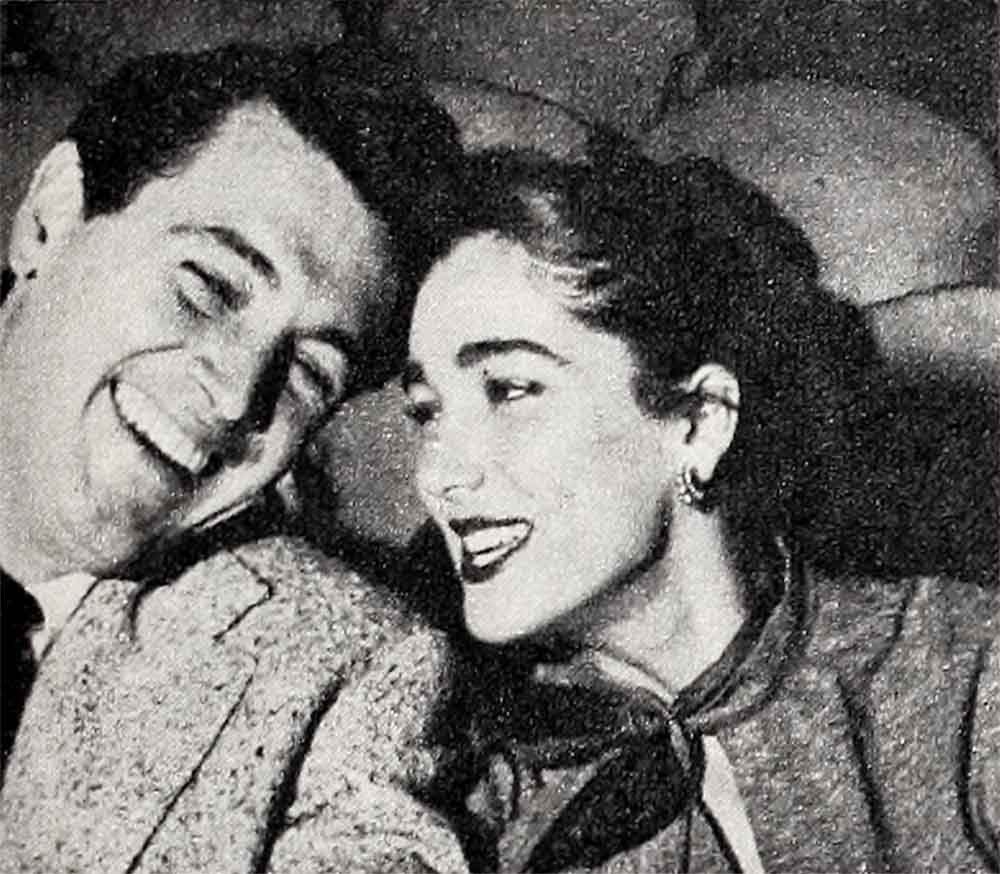
And in January, 1952, Rock and Jimmy Stewart went to Portland, Oregon, for the premiere of “Bend of the River.” The show was held up for forty-five minutes while fans outside the theatre yelled, “We want Hudson, we want Hudson.” Rock later insisted to newsmen who commented on the demonstration that the studio must have set up the cheering section, which of course was completely untrue.
But Rock’s honesty only extends as far as his work and career are concerned. Writers, for that reason, do their research all around Rock rather than go to him directly because he has steadfastly refused to discuss his private life.
In Winnetka, as in Hollywood, Rock was a one-woman man who preferred “going steady” to playing the field. Even when he first came to Hollywood Rock always had one girl. Soon after his romance with Vera-Ellen wore thin he “went steady” with a succession of giris including Terry Moore, Gene Tierney, Lori Nelson, Susan Zanuck and Barbara Ruick. His last steady dating, before meeting Phyllis, was with Betty Abbott.
He was an eligible bachelor and he played the role to its fullest. He dashed around town in Marisa Pavan’s sports car and was seen showing Anna Magnani the old world charms of Olivera Street in downtown Los Angeles’ Mexican area.
There was no set pattern to his dates. Often he would call one of his girl friends in the middle of the night to play his newest record for her over the telephone.
Most of the girls Rock dated in this period still remember him with fondness. “He liked to laugh and live it up,” says Piper Laurie. “Everything he did was fun.”
Julie Adams, who appeared in a number of pictures with Rock, remembers him most vividly.
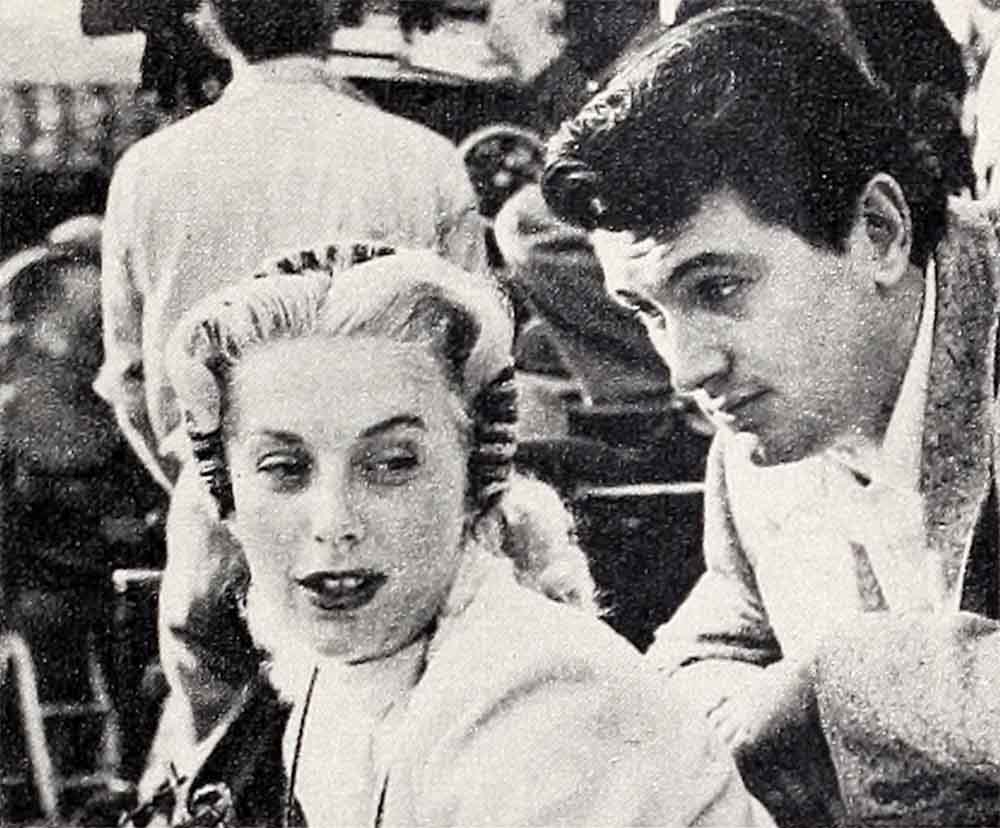
“We used to play a game called ‘Last Touch,’ ” she said. “It was, according to Rock, one of the higher-type adult games.” U-I publicists still tell the story of the frantic three months when both Rock and Julie were on a personal appearance tour. A week or ten days apart, the two young stars appeared on the same disk jockey shows and TV interview programs. One night Julie was progressing admirably in an ad lib interview over TV when the emcee—tipped a week earlier—tapped her shoulder and said, “By the way, Last Touch!” Julie’s mouth flew open and her eyes bugged over the gag set up by Rock.
But his earlier years in Hollywood were not all play for Rock. Sandwiched in with the fun were diction and dramatic lessons, plus instruction in athletic and body building activities.
Frankie Van, the Universal-International boxing coach, was also given the task of teaching Rock to stand up straight. Rock, conscious of his height since high school, slouched to de-emphasize it. Anywhere Van found him on the lot, Rock could expect a slap on the back and the order—“Stop slouching and stand up straight.” Perhaps Van went at it with more enthusiasm than necessary. He had a $100 bet for breaking Rock’s slouch habit.
Two years of dramatics lessons under the late Sophie Rosenstein made a great impression on Rock.
“She had a great influence on me,” says Rock. “I owe her a lot more than I can say. She was warm and magnificent. I can still remember her pounding an idea into me: ‘Nobody ever reads a line wrong; he might possibly read it wrong for that particular scene.’ I think of that every time I’m trying to get a characterization.”
The years 1952-1953 were productive for Rock. He was working hard and he was beginning to get the feel of his craft.
“I began to know what I was doing,” he says. “I was learning, not only from doing, but from watching other people. Yvonne de Carlo taught me much about the technical aspects of the business; Joel McCrea gave me great help in learning to ride; and John Mclntyre, one of my favorite actors, taught me to relax.
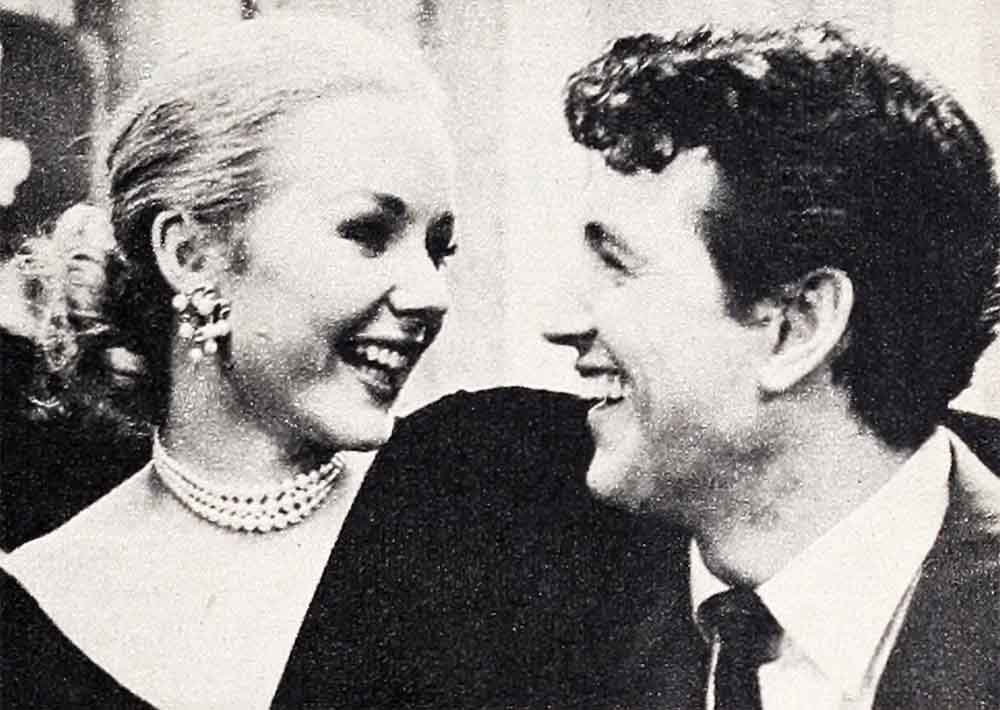
“But Raoul Walsh gave me two of the best pieces of advice on my carer. He told me to remember that whatever I do on set will be magnified twenty times on screen. He advised me to minimize what I did, to be still, and he was right.”
Bachelor Rock spent a good deal of time with a small circle of friends. The Van Johnsons, Barbara Stanwyck, Mrs. Rocky Cooper (when she was separated from Gary), all saw a lot of him. He particularly admired the home and marriage of Barbara Rush and Jeff Hunter.
He even told his mother about them. “Mom, I wouldn’t hesitate a second about getting married if I thought I could have a home life like theirs.”
Ironically the marriage he so admired was to break up a year later after he and Barbara returned from filming in Ireland. Rock was falsely accused of being the cause of the breakup.
All of the marital mishaps and failures he had seen as a child, as well as a man, caused Rock to be extremely marriage-shy. He was dating many girls but he found that for the most part he made better friends with men than women. “With a woman the elements of physical attraction enters the relationship,” he said. “It generally puts people on a different level from friendship.”
Although Rock has maintained a Gable-like discretion about his romances, more than one of them ended just about the time the young lady in question hinted too broadly about marriage. Rock has indicated that he “was a heel” on at least two occasions during his bachelor days but he just wasn’t “ready” for marriage.
During 1952 and 1953, Rock was busy for the first time in his career—as an actor. After years of playing juveniles and small parts the studio began to groom him for stardom.
From the beginning he was cooperative and appreciative. But, two things about his growing popularity bothered Rock—the demands on his time and the lack of privacy.
“It’s almost unbelievable,” he said of this period. “There are terrific demands on your time at first. It’s almost a twenty-four-hours-a-day sort of thing. And it’s almost impossible to have a private life. I figure ninety per cent of me belongs to the public but ten per cent should be private.”
Rock’s resentment over his decreasing privacy increased as he became more and more of a star. By Hollywood standards he was “hot.” That meant the studio was through using other stars to carry him in picture layouts. It was Rock who was the crutch for other, lesser known stars. Any girl dating Rock was sure of being mentioned in the columns and having her picture taken—and used—at Hollywood events.
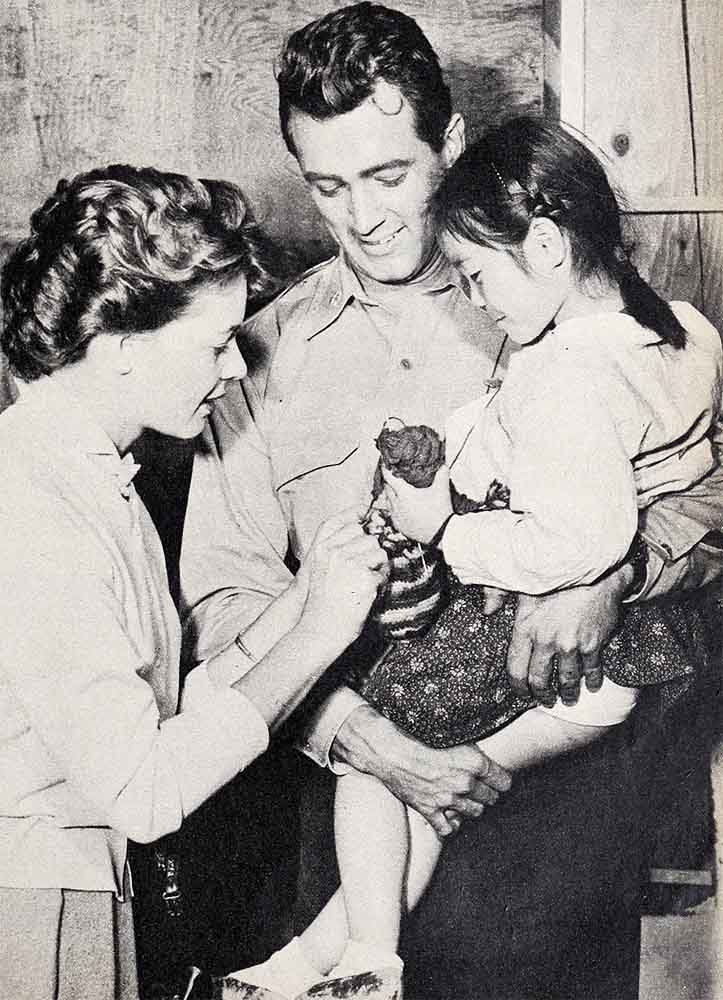
Along with his increasing stature as a new personality of importance Rock was also beginning to be considered as a person with acting promise. By 1953 even Rock began to feel he was learning his craft. And just about that time he had his appendix out.
After returning from the hospital Rock learned that producer Ross Hunter wanted him to play the lead opposite Jane Wyman in “Magnificent Obsession,” which would be one of the studio’s big pictures for the year.
“I was never worried about Rock Corning over on the screen,” Hunter recalls. “The thing that makes a star is romantic quality and he’s got it. However, we had to make him feel we were all with him 100 per cent.”
The fan mail following “Magnificent Obcession” established Rock as the top star on the U-I lot, and the studio immediately put him into “Captain Lightfoot,” which was to be filmed in Ireland co-starring Barbara Rush.
A few days before he was slated to leave for Ireland Rock went shopping for some Christmas tree ornaments.
A girl shopping at the same counter said, “Hello, Rock.”
Rock gave her a not-too-friendly look, thinking she was a fan or someone he didn’t know.
“I’m Phyllis Gates,” she said.
“Oh,” said Rock, turning away because the name meant nothing to him.
A few days later he went to Henry Willson’s office and nodded cordially at Henry’s assistant, who said coldly, “I see you know me now.”
Rock was mystified until she explained that she was the girl he had slighted. Rock was so embarrassed he invited her out, but Phyllis turned him down. Like all good movie romances, this one had its beginning in conflict and Our Hero went off to Ireland where he promptly forgot about Miss Gates.
While in Ireland Rock gave newsmen a natural story by kissing the Blarney Stone.
“I’ve always taken a lot of ribbing because I refused to kiss the Blarney Stone,” he told reporters after the event. “But I have a mental picture of the caption under a picture of me and the stone . . . ‘Rock kisses Rock’ Lord! But today Betty and Barbara made me do it . . . and I don’t dare look at the papers tomorrow.”
After they finished filming in Ireland the company had some free time, so Rock took Betty Abbott and Barbara Rush motoring through France. They report it was a hair-raising experience. One day during a rainstorm, while trying to find an inn on the winding mountain roads, they got caught in the middle of a French road race.
“I didn’t dare pull over to the side of the road for fear of being mowed down from the rear . . . so we just clung to the crown of the road,” recalls Rock. “Those French drivers didn’t even slow down. They just went around us.”
After the rest of the company had returned to America Rock browsed around Europe on his own.
“I water-skied in Venice, went through Switzerland and then got to Austria,” he said. “I have to agree with Douglas Sirk about Austria. He says, ‘In Paris work is distasteful, in Vienna it’s a sin.’ I thought it was a wonderful country.”
Eventually Rock had to return to work. He left Europe regretfully, with plans to return for a longer time.

“I’d like to live there permanently,” he says now. “I like their manners. Things are too speeded up here, the pressure is too high. I sometimes think I’d rather be doing anything there, even working as a bus boy, than living here.”
On his return to Hollywood U-I put him into “All That Heaven Allows.” He plunged into work, not wishing to answer the questions which were thrown at him. When he and Betty Abbott had gone to Europe together everyone had expected them to be married there. When Barbara Rush got her divorce shortly after returning, the Hollywood wags decided that Betty had been a herring across the trail of Barbara and Rock. He had nothing to say about either romance.
“I’m all talked out,” he said to persistent questioners. “Besides they’re all trying to marry me off.”
Betty Abbott started dating other men, Barbara Rush was busy working and Rock gave most of his energies to the new picture. He also found a new girl. He had described her earlier when he said, “I’d like her to be an independent kind of girl. I mean I want her to have a life for herself, as well as the life she’ll lead as a wife. İn that way I am sure there will be much more chance of both of us keeping our interest in each other.”
He had also met her before. She was Phyllis Gates, the girl he “hadn’t been much impressed with” at first.
“When I got back from Europe I suddenly saw Phyllis with different eyes,” says Rock.
He asked her to dinner and she turned him down three times. The fourth time she accepted but he had to cancel out because of some night filming at the studio. The same thing happened twice more. The third time Henry Willson took Phyllis to dinner instead—and Miss Gates walked into the restaurant to find Rock with another girl.
It was a studio publicist and she and Rock were having an urgent conference about stories. But Phyllis was entitled to doubts!
“It took almost a year and all the acting technique I had learned to convince Phyllis that I really loved her,” said Rock.
After almost a year of dating, Rock and Phyllis surprised no one in Hollywood by getting married. The only surprise was the way they got married—in secret.
Henry Willson went to Santa Barbara and made the arrangements. Rock called Chicago to Jimmy Matteoni, whom he had always planned on having as his best man.
“Rock called at six p.m. Monday night,” says Gloria Matteoni. “Jim wasn’t home, so he called again around two a.m. Tuesday morning. We left Chicago Tuesday night and were in Santa Barbara for the wedding Wednesday.”
On the way to Santa Barbara the wedding party stopped in Ventura to obtain a marriage license, and Rock got a ticket for speeding. “It cost me twenty-seven dollars to pay that ticket.”
Then, on November 9, 1955, Rock and Phyllis were married in a simple ceremony by the Rev. Nordahl B. Thorpe, minister of the Trinity Lutheran Church of Santa Barbara.
Phyllis wore a gown of brown imported Italian silk and carried white carnations and gardenias. Rock wore a dark suit and a white carnation.
“Was I nervous?” asked Rock later. “I was falling apart.”
After a simple wedding supper, Phyllis and Rock set out for a honeymoon in Jamaica. “It was exactly the way I wanted it,” says Rock. “I think Phyllis would have liked a big wedding with the dime in her shoe and the whole bit, and I think she’d have had it, had she married any other guy. But she had the bad luck to pick me, and she understood that an elopement was the only possible way.”
The Hudsons returned to Hollywood, tanned, rested and happy.
“Happy is an understatement,” claims producer Ross Hunter. “They arrived at my house at two a.m., the night they came back from their honeymoon, and kept me up for three hours while they raved about how great it was to be married.”
Professionally, 1955 was Rock’s best year. He had made a number of pictures fast, but his studio was giving him better and better films.
In return for doing “Never Say Goodbye,” a tearjerker in which he starred with Cornell Borchers, U-I lent him to Warners’ for what is probably his best role to date, Bick Benedick in “Giant.”
George Stevens, known for getting the most out of every scene, worked Rock harder than he’d ever worked before.
Rock is very impressed with Stevens. “I’m a better actor for having worked with George Stevens,” he says. “He made me build a characterization in spite of myself.”
Stevens, on the other hand, feels that Rock has a great potential. “In Rock we have a symbolic picture of the most romantic kind of leading man . . . and in addition to the physical plusses he has the business of being a fine actor, who goes to work with intelligence.”
Again, Rock almost didn’t do the role because, he says, “At the last minute I felt cold, afraid. This was the most complicated role I ever had to face. I felt I would never live up to the demands of the role and I thought I had to get out before it was too late.” It took the combined talents of George Stevens and Phyllis to talk him into it.
After “Giant” was finished Ross Hunter started plans to film “Battle Hymn” at U-I. It is the biography of the Flying Parson, Dean Hess, and was to be the most expensive picture U-I ever made. Rock begged for the lead. Hunter was frankly skeptical.
“ ‘Battle Hymn’ was a tour de force,” explained Hunter. “Rock would have no one to lean on or help him as he had in the past. He’d have to run the gamut from comedy to deep tragedy all by himself—literally carrying the picture alone. I didn’t know if I could pin all the money on him without expert acting support. But he begged me, and Rock is only good if he really believes in a part. He wanted this one. I have only one comment to make, now that the filming is over. It’s all his picture and it is great.”
Rock was recently loaned to M-G-M for the lead in “Something of Value,” which was filmed on location in Africa. But Universal-International announced shortly after filming was over that they had no intention of loaning their hot property away from his home studio again in the near future. And his price will be a great deal higher than the current $200,000 a picture, when and if they do.
The studio immediately put Rock into “Written on the Wind,” in which he costars with Lauren Bacall and Robert Stack. He plays the “good guy.” The plum acting role, that of the drunk, goes to Stack. Rock wanted to play the drunk, but the studio said no.
“Rock’s fans won’t accept his doing anything shoddy,” says Dave Lipton, U-I’s publicity head. “They like him because he’s what they want their daughters to marry, or their children’s father to be, or their childhood sweetheart. If we let him break out of that character they’d howl.”
Lauren Bacall, who has gotten to know him since doing the picture, says he had a hard job.
“When your name is bigger than your experience, like Rock’s, a lot is expected of you,” she says. “He delivered.”
“Wind” was a reunion for Rock and Bob Stack, who have been good friends since Rock’s first picture, “Fighter Squadron.”
“I can still see him on that first day in front of the cameras,” recalls Stack. “He was very shy and awkward and humble, And kind of apologetic for being there at all. But he was also very big, very handsome.”
Stack echoes the sentiments of most of his friends, both in Hollywood and Winnetka, who find that success has spoiled Rock Hudson very little.
‘The thing I like about him,” says Bob, “is to find someone who really has stature, must know he has it, and yet doesn’t show it. He seems to be almost apologetic for being successful.”
Most of Rock’s friends say success has not changed him at all.
“He’s still the same old goofball,” says Gloria Matteoni, who has known him since childhood.
Barbara Krefit, who used to double-date with him in Winnetka, says, “He still has that infectious smile and the ‘Andy Gump’ laugh. He has more poise but that’s because of experience.”
The only significant change in Rock seems to be one of attitude. Until now he has sat by quietly and let other people guide his career. He’s always felt lucky because he was so unsure of himself as an actor. But the accolades he has received from pictures like “Magnificent Obsession,” “Giant” and “Battle Hymn” have given him a feeling of new confidence.
Now he talks of trying his wings on his own. He has formed a company with Henry Ginsberg, co-producer of “Giant” and plans to make pictures in which he plays off-beat roles. He wants to do a drawing room comedy first, followed by a Western.
And, as a married man, he has plans for a family. “I’d like a lot of kids to make up for being an only child,” says Rock. “A boy first, after that it doesn’t matter, as long as it’s a big family.”
As I started by saying at the beginning of this article, Rock is really a pretty ordinary guy. That is probably not only the secret of his success—it’s also what makes him unusual.
THE END
GO SEE: Rock Hudson in U-I’s “Battle Hymn” and “Written on the Wind,” M-G-M’s “Something of Value,” and TCF’s “A Farewell to Arms.”
It is a quote. PHOTOPLAY MAGAZINE MARCH 1957
AUDIO BOOK




